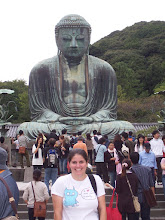I stood on my balcony and watched the sailors walking home. All wore their dress whites and carried giant green sea bags or at least duffel bags. Some walked alone, others with their families.
Watching them, I remembered the ceremony on the pier when the U.S.S. George Washington pulled into port here in Yokosuka, Japan. Hours before the ship was due to pull in, men and women lined the balconies and rooftops nearby, each hoping to see the arrival of the first nuclear air craft carrier ever forward deployed to Japan.
As I maneuvered over the crowded sidewalks, I tried to decide whether to laugh or cry. The air seemed charged with more emotion than it could bear. Thousands of hearts and minds centered all their energy on one long stretch of pier.
I was picking through the goodies being given away at the vendor stalls when I heard the announcement “the GW is less than a mile away.” The crowd cheered and clapped. I drifted toward the end of the pier, wanting to be among the first to see the ship enter the bay.
I waited next to the press pen. Children pointed at the seven or eight helicopters flying low overhead. Finally, I heard a woman tell her son.
“Here it comes.”
“Where?”
“See that helicopter flying real low? It stays with the ship.”
Soon I saw the radar rig thrusting up from behind the buildings and trees like an alien antenna reaching for the stars. Behind us, a Japanese drum troupe beat out a rhythm that sounded like the summoning of an ancient god. When the ship finally came fully into view the little girl behind me jumped up and down screaming “go, daddy, go,” until her mother hushed her.
I wanted to cry. Even from across the bay I could see the sailors standing at attention around the rim of the ship - manning the deck, as they called it. Their white uniforms cut silhouettes out of the sky. As the ship drew closer the drums stopped and I could breathe again.
The ship pulled up perpendicular to the pier and then began to rotate slowly.
“Why are they spinning it?” I asked one of the GW officers sent ahead to oversee the transition.
“They have to turn it around so they can get off over the prow.”
I watched a few more moments and then I heard him say. “It’ll go quickly now that it’s turned around. If you want to get a seat you’d better go now.”
Seating had been set up for the GW families. We shifted impatiently in our chairs while we waited for the speeches and anthems and ceremonies to be over so we could see our sailors. The sun beat down on the chairs that spilled out from under the awning and on us sitting in them.
Finally, it was all over. Shore leave was called. The sailors came down to meet their families. Not the nukes of course. Nukes always stay until last. I would have to wait, maybe hours, possibly a day, to see Grant.
I walked home, adrift in a sea of white navy uniforms and chattering children.
Even as I write this – the tide is still coming in.



